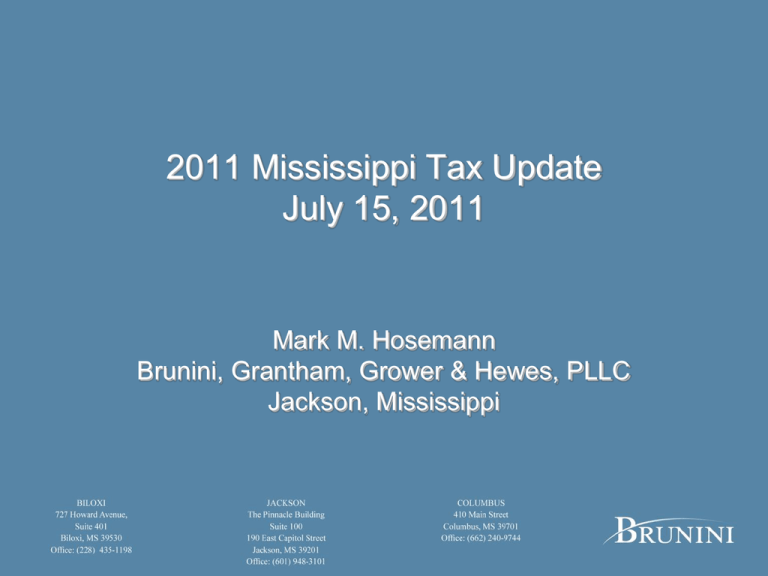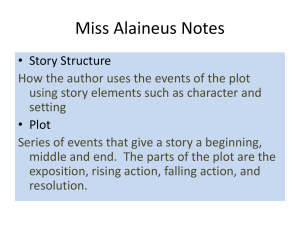Mississippi Tax Developments 01224607
advertisement

2011 Mississippi Tax Update July 15, 2011 Mark M. Hosemann Brunini, Grantham, Grower & Hewes, PLLC Jackson, Mississippi Income and Franchise Tax Legislative Developments • Human Pharmaceutical Products Contributions. S.B. 3097, Reg. Sess. (Miss. 2011). – For a charitable contribution by a “major supplier” of human pharmaceutical products in excess of $250 million, the federal charitable contribution limitation will be imposed, but MS income can not be reduced below zero – Major Supplier- $100M of pharmaceutical products shipped into MS and receiving funding from the MS Industry Incentive Financing Revolving Fund • Human Pharmaceutical Products Contributions. S.B. 3097, Reg. Sess. (Miss. 2011). – Also provides that for multi-state corporations that are major suppliers, receipts from sales of human pharmaceuticals to MS distribution facilities will not be included in MS receipts for the franchise tax apportionment ratio calculation • Rural Economic Development Credit. S.B. 2921, Reg. Sess. (Miss. 2011). – Reenacts the MS Rural Economic Development Assistance Program (RED) and the income tax credits associated therewith – Extended through October 1, 2015 • Mississippi Motion Picture Incentives Act. H.B. 1161, Reg. Sess. (Miss. 2011). – A motion picture production company that expends at least $50,000 in base investment, payroll, or both is entitled to a rebate of 25% of the base investment. – In addition, a payroll rebate for 30% of the payroll paid to resident employees whose wages are subject to Mississippi withholding was approved, and a payroll rebate for 25% of the payroll paid to nonresident employees is available pending final approval on July 1, 2014 at the earliest. • Historic Structure Rehabilitation Tax Credit. H.B. 754 & H.B. 1311, 2011 Reg. Sess. (Miss. 2011). – Extends existing credit to December 31, 2013 – If the income tax credit allowed for the costs incurred in the rehabilitation of certified historic structures exceed the taxpayer’s tax liability for the year and the amount of the tax credit exceeds $250,000, the taxpayer may elect to claim a refund in the amount of 75% of the excess credit in lieu of the ten-year carryforward of the credit. The election must be made in the year in which the rehabilitated property is placed in service. Refunds will be paid in equal installments over a two-year period. The law also limits the aggregate amount of credits that may be awarded to $60,000,000. • Cargo Income Tax Credit Extended. S.B. 2922, 2011 Reg. Sess. (Miss. 2011). – Removes the repealer on the income tax credit for port charges for cargo imported into the state. The credit for export charges was extended in 2010 through 2012. • Early Payment of Withholding Tax. H.B. 1059, 2010 Reg. Sess. (Miss. 2010). – Delays until July 1, 2012 an increase in the amount of average monthly withholding liability that triggers the requirement for early payment of withholding tax liability by certain taxpayers • Increases threshold to $50,000 from $20,000 • Tax Return Confidentiality. H.B. 704, 2010 Reg. Sess. (Miss. 2010). – Tax return information must be maintained in confidential manner unless disclosure is required by a court order – DOR can release income tax information to Dept. of Human Services for individuals who are delinquent on child support • DOR confidentiality of information. 2010 S.B. 3082, Reg. Sess. (Miss. 2010). – Authorizes the DOR to enter into confidentiality agreements with officers and employees of the Mississippi Development Authority. Such officers and employees would be subject to the same restrictions on the release of taxpayer information that apply to the DOR. • Conversion of Traditional IRA. H.B. 1637, Reg. Sess. (Miss. 2010). – Excludes income amounts converted from a traditional IRS to a Roth IRA from the definition of “gross income” – Exclusion is also available to a spouse or other beneficiary at the death of the primary retiree • Derivative Tax Liability. S.B. 2967, Reg. Sess. (Miss. 2010). – Liability of certain owners or members of corporations or LLCs for income withholding tax and sales tax is derivative of the entity – The 3-year assessment period for the derivative liability doesn’t begin to run until the entity’s liability becomes final • Individual Income Tax Payable in Installments. S.B. 2753, Reg. Sess. (Miss. 2010). – If state income tax liability is not in excess of $3000 and the taxpayer has entered into an installment agreement with the IRS for federal taxes, state income taxes can be paid in installments over no more than 60 months • Tax Return Preparer Penalty. H.B. 1462, Reg. Sess. (Miss. 2010). – Mandatory penalty for grossly negligent preparation of an income tax return is now discretionary – Commissioner of DOR assess these penalties and handles collections just as with the assessment and collection of income taxes • Exemptions for clean energy and aerospace enterprises. H.B. 1701, Reg. Sess. (Miss. 2010). – Grants a 10 year franchise and income tax exemption and certain sales and use tax exemptions to manufacturers of systems or components used in the generation of clean energy or the aerospace industry or those that operate data centers or provide research and development or job training services for such qualifying industries. Income and Franchise Tax Judicial Developments • Buffington v. Mississippi State Tax Commission – MSSC addressed § 27-7-49, which provides that the DOR may issue an assessment for additional state income tax when the IRS increases a taxpayer’s reported taxable income, but that such an assessment may not be issued “after three (3) years from the date the Internal Revenue Service disposes of the tax liability in question.” – Taxpayer argued that the IRS “disposes of the tax liability in question” on the date a written settlement between the IRS and the taxpayer is executed. In other words, the taxpayer viewed the execution of a Form 4549 and the payment of the liability to constitute disposition of the matter. • Buffington v. Mississippi State Tax Commission (cont.) – – MSSC held that the IRS “disposes of the tax liability in question,” for purposes of §27-7-49, on the date the DOR receives notice from the IRS via Form 3210 that the taxpayer’s reported taxable income has been changed. Thus, the three-year period for assessing additional state income tax as a result of an increase in the taxpayer’s taxable income by the IRS begins running upon receipt of the Form 3210 by the Mississippi Department of Revenue from the IRS. • Davis v. Mississippi State Tax Commission – Taxpayer died having failed to pay federal or state taxes from 1997-2004 – IRS assessed federal tax liability against the estate. MS State Tax Commission filed notices of tax liens in Lee County Chancery Court. – Chancery Court gave the state priority based on § 27-7-55, which gives an enrolled notice of tax lien the status of a judgment • 26 USC §6323(a)- a judgment lien creditor has priority over a federal tax lien • Davis v. Mississippi State Tax Commission (cont.) – MSSC overturned the Chancery Court – Ruled that in spite of the language of § 27-7-55, the Department of Revenue is not a “judgment lien credit” within the meaning of the federal tax law giving priority to judgment liens over federal tax liens because the tax lien arose as a result of an administrative determination rather than a court judgment. Therefore the IRS had priority over the DOR’s tax claim. Income and Franchise Tax Administrative Developments • Taxability of Gulf Oil Spill Payments – DOR issued notice that payments received from BP are included in gross income and should be reported like the lost business income would have been – Payments for damaged or destroyed property are not included in gross income unless the payment exceeds the adjusted basis of the property • Gambling Winnings – DOR issued a reminder that gambling winnings reported on a W2G, 1099 or other informational return from MS casinos are subject to 3% nonrefundable income tax withheld by the casino at the time of payout – Winnings from MS casinos are not included in MS income – A nonresident with only MS casino winnings or losses should not file a MS return Sales and Use Tax Legislative Developments • Mississippi Motion Picture Incentive Act. H.B. 1161, 2011 Reg. Sess. (Miss. 2011). – – Repeals the sales tax exemption under Section 2765-101(bb) for sales of production items used in the production of a motion picture. A new exemption for the sale of supplies and equipment sold to an IRC §501(c)(3) host organization coordinating a professional golf tournament to be played in Mississippi is allowed effective March 24, 2011. • Municipal Special Sales Tax. S.B. 2839, 2011 Reg. Sess. (Miss. 2011). – – – – Revises § 27-65-241 which authorizes the levy of a municipal special sales tax in municipalities with a population over 150,000 Revenue collected pursuant to the tax must be used to pay the costs of road and street repair, reconstruction and resurfacing projects based on traffic patterns, need and usage, and for the costs of water, sewer and drainage projects. A municipality may not hold an election with regard to such a special sales tax more than twice. The Department of Revenue can retain 1% of the proceeds of the tax to defray the costs to the Department for collection of the special tax. • Tourism Project Sales Tax Incentive Program. H.B. 1107, 2011 Reg. Sess. (Miss. 2011). – – Revised the definition of “Tourism Project” for purposes of the Tourism Project Sales Tax Incentive Program to include hotels having a minimum of 25 guest rooms or suites, a minimum private investment of $15,000,000 and $200,000 per guest room or suite, and having restaurants, spas and other amenities as determined by the MDA. “Tourism Project” now also includes tourism attractions located within Entertainment Districts with live entertainment 3 nights per week and seating for at least 40. • Tax on Refinery Machinery and Refinery Construction Activity. H.B. 598, 2011 Reg. Sess. (Miss. 2011). – – Deletes the repealer of a provision which levies a tax on the sale of manufacturing or processing machinery installed or used as a refinery in Mississippi and on construction activities performed at or in regard to such a refinery. The law also requires the owner of the refinery holding a direct pay permit issued by the DOR to furnish the permit to the seller of the machinery or the provider of the construction services, as a result of which the seller or provider of construction services is relieved of the duty to collect the tax and the owner of the refinery will pay the tax. • Tax on Refinery Machinery and Refinery Construction Activity. H.B. 1684, 2010 Reg. Sess. (Miss. 2010). – – 1.5% on the gross proceeds of sales of manufacturing or processing machinery to be installed or used at a refinery 3.5% of 103.5% of the total contract price or compensation paid for the performance of construction activity at a refinery • Emergency Telephone Service Charge. S.B. 2938, 2010 Reg. Sess. (Miss. 2010). – – – – Imposes a $1.00 charge on all retail prepaid wireless service transactions in MS for an emergency telephone service to be collected and remitted by the provider along with sales and use tax The provider can take 2% of the amount collected as an administrative deduction Collect the charge and remit it to the DOR by the 20th of the following month County Boards of Supervisors can impose an additional $1.00 charge on residential users and $2.00 on businesses for Voice over Internet Protocol telephone services • Farmers Market Exemption. H.B. 1566, 2010 Reg. Sess. (Miss. 2010). – Adds to the list of sales tax exempt agricultural products food products that are grown, made or processed in MS and sold at farmers markets that have been certified by the MS Department of Agriculture Sales and Use Tax Administrative Developments • 2011 Sales Tax Holiday. – – – DOR issued a notice reminding taxpayers that the state’s third sales tax holiday will be Friday, July 29, 2011 through midnight on Saturday, July 30, 2011. Clothing and footwear items under $100 per item are exempt from sales tax Accessories, jewelry, backpacks, cleats, sporting goods, and school supplies are not exempt • Notice to Pet Breeders. – – DOR issued Notice 72-11-001 to clarify for pet breeders that the exemption from sales tax for sales of livestock doesn’t not include dogs, cats, or other domestic animals usually kept as pets Those who do not hold themselves out as breeders or breed pets infrequently are not required to register to collect sales tax • Selling pets from one litter no more than once in a 2-year period is considered infrequent • Wrecking and Towing Services. – – DOR amended Miss. Admin. Code 35.IV.04.01 to provide that wrecker or towing services, when not provided in conjunction with any other taxable services (such as repairs or storage) are not subject to sales tax If other services are provided in conjunction with the towing service, then the entire value of the towing and the other services combined is subject to sales tax Property Taxes Legislative Developments • Tax Sales of Property in a Public Improvement District. S.B. 2938, 2011 Reg. Sess. (Miss. 2011). – – If property in a public improvement district is to be struck off to the state following an unsuccessful tax sale pursuant to § 27-41-59, the county tax collector may offer the property for sale for a second time. If there is no purchaser of the property on the second attempted sale, the property shall pass to the state as if no second sale occurred. If the property is sold at the second sale, the property may be redeemed at any time within two years after the date of the second sale in the manner provided in § 27-45-3. • Publication of School Boards’ Annual Ad Valorem Tax Assessment. S.B. 2547, 2011 Reg. Sess. (Miss. 2011). – School Boards are not required to publish an annual ad valorem tax assessment in the newspaper if there is no increase in the ad valorem tax effort in dollars that has been proposed. • Costs for cleaning certain property to be added to tax bills. H.B. 1412, 2010 Reg. Sess. (Miss. 2010). – Authorizes costs and penalties assessed by a municipal governing authority to clean private property to be added to ad valorem tax bills and to be collected by the tax collector. The tax collector is authorized to sell the property when such costs and penalty are not paid. Property Taxes Judicial Developments • City of Jackson v. Rebuild America, Miss. Ct. App., Dkt. No. 2008-CA-02121-COA (Miss. App. 2011). – – Property was conveyed by the City of Jackson to a community development corporation by a quitclaim deed with a possibility of reverter for construction of low and moderate income housing. The corporation failed to meet the conditions set forth in the quitclaim deed and also failed to pay taxes in 2004. The property was sold in a tax sale in 2005, with proper statutory notice being given to the corporation, but no notice was given to the City of Jackson. The tax sale was voided because the City had a reversionary interest in the property which was sufficient to require that statutory notice of the right of redemption be given to the City. • Holly Springs Realty Group, LLC v. BancorpSouth Bank, Miss. Ct. App., Dkt. No. 2009-CA-00923-COA (Miss. App. 2010). – Tax sale of a condominium to a purchaser was void as to the bank that held a mortgage on the property because the chancery court clerk failed to give notice to the bank after the tax sale and before the expiration of the redemption period. – The tax sale being void, the bank’s mortgage lien was unaffected , and the bank was entitled to foreclose on the property but had to reimburse the purchaser for the real property taxes the purchaser paid in the tax sale. • Fidelity & Guaranty Insurance Co. v. Blount, Miss. S. Ct., Dkt. No. 2008-CA-01931-SCT (Miss. 2011). – – – The substantive and procedural due process rights of several surety companies were not violated when the State Tax Commission failed to give notice of tax audits and the resulting assessments of contractors tax against several construction companies that were the principals of the surety companies. The surety companies were deemed to not be taxpayers contemplated under Section 27-65-37 that would be entitled to notice of assessments. The taxpayer entitled to notice of an assessment is the person liable for tax to the state or who has paid tax to the state, or the person required to obtain a sales tax permit before engaging in business in the state. The construction companies, not their surety companies, were the taxpayers here and they were afforded the due process required by law. The sureties were given proper notice of their principals failure to pay pursuant to Section 27-65-57 and proper demand was made on them to pay the unpaid taxes, including damages, penalties and interest, under their surety bonds. • 3545 Mitchell Road, LLC v. Bd. Of Supervisors of Lee County, Miss., Dkt No. 2009-CT-00292-SCT (Miss. 2010). – – The Board of Supervisors reassessed affordable rental housing complexes because of a failure on the part of the taxpayers to submit proper documentation of net operating income which would entitle the taxpayers to a more favorable assessment formula. The more favorable assessment formula was mistakenly still initially used despite the taxpayer’s failure to submit the proper documentation • 3545 Mitchell Road, LLC v. Bd. Of Supervisors of Lee County, Miss., Dkt No. 2009-CT-00292-SCT (Miss. 2010) (cont.). – – The Board of Supervisors subsequently reassessed the taxpayers using the standard assessment formula, drastically increasing the ad valorem property taxes owed by the taxpayers. MSSC held that § 27-35-143(11) applies to authorize a reassessment when property has been incorrectly categorized. The Supreme Court found no evidence that the taxpayers’ property was incorrectly categorized as “affordable rental housing” so the reassessment was not authorized. Property Taxes Administrative Developments • Reclassification of Property Does Not Result in Erroneously Paid Taxes. – – – § 27-73-7 authorizes a refund following a reassessment in the case of “erroneously” paid taxes. The Attorney General issued an opinion in a situation where a property’s classification unit was modified from Class A to C+ due to architectural and landscaping factors. The property was reassessed and valued lower than in prior years. The taxpayer inquired as to whether the resulting decrease in assessment constituted an error in assessment that would authorize a refund of the prior year’s taxes paid in excess of those due under the current decreased assessment. The Attorney General opined that such a classification which led to a decreased value and a lower assessment did not result in the authorization of a refund for prior year’s taxes paid at the higher assessed value. • City-owned property leased to a private nonprofit is taxable. – – – Attorney General opined that a private leasehold interest in city-owned property is not exempt from taxation unless expressly authorized or provided by law. Specifically, when land owned by the city is leased to a nonprofit operator for use as a golf course, the leasehold interest is taxable by the county. In assessing the value of the leasehold interest, the tax assessor must determine the true value of the leasehold, based upon the current use of the property. • Past due ad valorem taxes run with the land. – The Attorney General opined that past due ad valorem taxes assessed on real and personal property run with the land and survive foreclosure. • Record owner of January 1 liable for entire year’s ad valorem taxes. – The Attorney General opined that ad valorem taxes are assessed upon real property on January 1 of each tax year and the record owner on that date is liable for the entire ensuing year’s taxes, even if the property is sold after January 1. Therefore, for that year’s tax assessment purposes, the tax records as of January 1 cannot be altered. • Fee-in-lieu of taxes. – – – – – § 27-31-104 gives County Boards of Supervisors and municipal authorities the power to grant a fee-in-lieu of taxes for projects totaling over $100,000,000.00. The fee-in-lieu of taxes may be stated as a fraction or percentage of the ad valorem taxes otherwise payable or may be a set, stated dollar amount. If the fee-in-lieu is stated as a fraction or percentage of ad valorem taxes otherwise owed, it may increase or decrease from year to year based on changes in millage rate or assessed value. The Attorney General clarified that the statute does not allow the granting authority to set a minimum amount of fee to be collected in the event that the fee is calculated as a fraction or percentage of the ad valorem tax that would otherwise be owed. In the event that the fee is a set, stated dollar amount, that statute provides that the actual fee collected must be the greater of that stated dollar amount or one-third of the total amount of all ad valorem taxes otherwise payable each year. Other Taxes • Insurance Premiums Tax. H.B. 1528, Reg. Sess. (Miss. 2011). – Insurance companies that invest designated capital in MS small business investment companies earn a credit against state premium tax liability in an amount equal to 80% of the participating company’s investment. • A credit of 16% annually over 5 years • Decertification of the MS small business investment company can result in disallowance or recapture of the credit • Tobacco Equity Tax. S.B. 3020, Reg. Sess. (Miss. 2011). – – Every MS licensed cigarette distributor is required to report an pay the $0.0135 cigarette tax on all cigarettes purchased from manufacturers who were not party to the tobacco settlement agreement July 1 of each year, the tax increases by the greater of 3% or the percentage increase in the most recent Consumer Price Index for urban consumers Other Points of Interest Reorganization of Department of Revenue, Effective July 1, 2010 -State Tax Commission as administrative body becomes Department of Revenue. - Ed Morgan appointed Commissioner of Revenue. - Administrative functions generally unchanged. - Board of Review, first level of administrative appeals, remains in Department of Revenue. - Board of Tax Appeals, an independent body, is now the second level of the appeal process Significant changes to rules of appeals. - Former 30-day appeals periods generally extended to 60 days. Both the taxpayer and the Department may appeal adverse decisions of the BTA. - Taxpayer-Appellant must post a bond for one-half the amount in controversy, but there is an avenue to avoid the bond if the Department’s interests are otherwise protected. Important for individual taxpayers. In the alternative, may pay the tax under protest. - Must pay the uncontested amount within the 60-day appeal period. Revised Limited Liability Company Act Effective January 1, 2011 and 2012 • Mississippi Revised Limited Liability Company Act. H.B. 683, 2010 Reg. Sess. (Miss. 2010) revised Mississippi’s Limited Liability Company Act. The Revised Limited Liability Company Act (“Revised Act”) revises and clears up uncertainty in the existing laws and adds new sections including provisions from the Delaware LLC Act and the Revised Uniform LLC Act. • Revised LLC Act - Allows, but does require, LLCs to have officers with traditional corporate titles. - Liability of members, managers, and officers may not be limited with regard to wrongful financial benefits, intentional infliction of harm, intentional criminal acts, wrongful distributions, bad faith violation of covenant of good faith and fair dealing. • Revised LLC Act (cont.) - Eliminates concept of dissociation since it is no longer required under tax laws. - A member loses governance rights (but not financial rights) if the member voluntarily files for bankruptcy, makes an assignment for creditors, seeks appointment of a receiver or trustee, or, in the case of an entity-member, files for dissolution or involuntarily becomes subject to such proceedings - Heirs of a deceased members become members by default if the Operating Agreement does not provide otherwise (does not apply to PLLCs). - Provides default rule that member voting is based on profit sharing percentage. • Revised LLC Act (cont.) - Requires domestic and foreign LLCs to file annual reports. - Foreign LLCs must pay an annual filing fee of $250. There is no filing fee for domestic LLCs. - Authorizes the Secretary of State to administratively dissolve an entity for failure to file an annual report, pay fees or fines owed, or have a registered agent in the state. • Implementation of the Revised LLC Act - Effective date for new entities is January 1, 2011. - Existing entities must begin filing annual reports in 2011, but the remaining provisions of the Revised Act are not effective for entities in existence prior to January 1, 2011 until January 1, 2012. • Implementation of the Revised LLC Act (cont.) - Annual Reports due April 15th every year, beginning in 2011 - The Secretary of State’s Office is reporting that any entity filing by September 1, 2011 will be treated as filing its first Annual Report on time - In mid-September 2011, delinquent LLCs will be notified that they have until December 1, 2011 to file an annual report or they will be administratively dissolved • Uniform Real Property Recording Act. – – – For documents eligible to be recorded in the land records, if the law requires that a document be an original, be on paper or other tangible medium, or be in writing, an electronic filing will suffice If the law requires that a document be signed or notarized in order to be recorded, an electronic signature and acknowledgment will suffice Effective July 1, 2011 • Uniform Athlete Agents Act. – – – – Agents must register with the Secretary of State, give notice of any pending litigation against them and submit to a criminal background check Before having initial contact with a student-athlete, family members, or other representatives, the agent must notify the student’s educational institution Within 72 hours of signing a contract with an agent, or before the athlete’s next scheduled event in which he or she could participate, both the agent and the student must notify the educational institution Civil penalties up to $25,000 can be assessed • Automatic Extension of Corporate Charters. – – If a business corporation was created for a limited period of time before April 18, 1988, the life of the business corporation will be deemed to be perpetual if it continued operations for 30 days after March 14, 2011, even if the limited period of duration has expired If a nonprofit corporation was created for a limited period of time before January 1, 1988, the life of the business corporation will be deemed to be perpetual if it continued operations for 30 days after March 14, 2011, even if the limited period of duration has expired • Mississippi Nonprofit Corporation Act. – – Any nonprofit corporation which is granted a determination of exemption from tax pursuant to § 501(c)(3) of the Internal Revenue Code must notify the Secretary of State of such status within 30 days of receipt of the determination letter The nonprofit corporation must also notify the Secretary of State within 30 days of such taxexempt status being suspended or revoked Questions?






